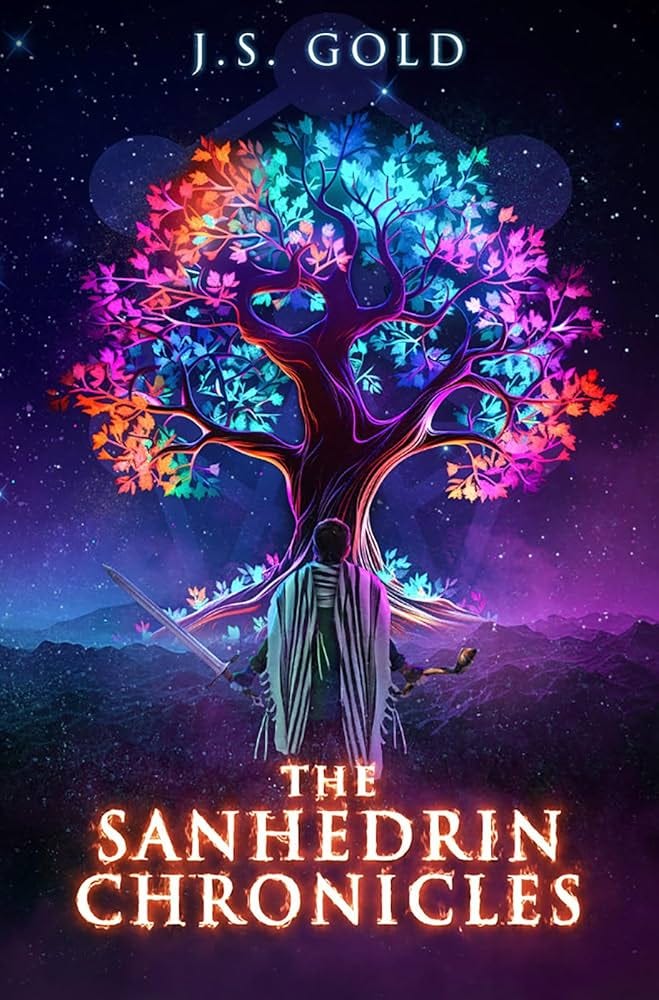Move Over, 'Jew-Coded': Why Fantasy Needs Explicit Jewish Representation
+ my Jewish fantasy, The Sanhedrin Chronicles, is now out on audiobook!
Recently, I had the privilege to attend the Jewish Book Festival in NYC. Especially at a time when to be Jewish is to feel beset on all sides, it was inspiring to feel such pride and security among my own people, discussing literature and its unrivaled power to inspire growth. I don’t think it’s a coincidence that as literacy rates fall across the US, we Americans find ourselves in this moment – and by that I mean, well…*gestures vaguely at everything.*
At the festival, there was a panel on Jewish fantasy. Cue me squealing. It was a blast, and so heartening to see that my own Jewish fantasy, The Sanhedrin Chronicles, was at home as part of a larger Jewish movement within speculative fiction. As with other folk traditions, the history of Jewish mysticism has had to be reclaimed after centuries of immigration and assimilation here in the States; a long and arduous road, but well worth taking. Over the course of the panel, I saw in real time the room feeling empowered by these hitherto hidden corners of their own identity and inheritance.
It therefore pained me to hear one of the panelists explain how they incorporated Jewish folklore into their fantasy by changing the word “Jewish” – and indeed all the other markers of Jewish identity – into other, made-up words. “Instead of Jewish, I called this fictitious ethnicity in my work something else,” the panelist said. Then, snapping their fingers, “and poof, I could make everyone in the story Jewish-coded without calling them Jewish.”
On the one hand, as a fellow fantasy author, I understand why they did what they did. Their story was a secondary-world fantasy, a story that doesn’t take place on Earth, but in some elseworld (think Middle Earth or Narnia). It would seem out of place to explicitly use the word Jewish in such a world – imagine Jews surrounded by elves, orcs, and the like:
“Come, Mordechai, we must slayeth the dragon!”
“Ooh, it’s the sabbath. Can we slayeth him tomorrow?”
“But the village is in danger today!”
“Alright, alright. But if there’s a door to the lair, you’ve got to open it.”
The idea that it’s enough for fantasy characters to be Jew-coded, and not explicitly Jewish, was one examined by author Cassandra Clare. In her essay “Monsters, Magic and Imagination: Writing Jewish Fantasy,” the famed Mortal Instruments writer explained how “to me, the connection between my Judaism and the [Mortal Instruments] is obvious: it is the values those books espouse that are deeply informed by my religion and my culture.” Clare later discussed how in one of her subsequent stories, Sword Catcher, she modeled one of the ethnic groups, the Ashkar, after Jewish identity and history, and that her hope was that despite not being explicitly Jewish, the audience would understand the analogy of this group’s plight. And in previous decades, or even a mere couple of years ago, such Jewish representation might’ve sufficed. But much has changed in just two years.

As it happened, Clare’s essay was published on October 9th, 2023, and presumably written before the 7th. One has to wonder whether she would’ve changed her stance if she knew how events would unfold. Only she herself can tell. But as a Jewish fantasy novelist promoting his very Jewish work well after the 7th, I’m convinced that such coded representation isn’t enough.
Since my novel’s release, I’ve been accused online of worshipping the devil and killing children. I was also told to hang myself. Such venom is a collective moral failing, one that speaks to a society where empathy is at a premium, and whose primary mode of connection, social media, purposely supplants it with hatred. The only way to combat this corrosion is to truly know each other – not just in real life, but the avatars we create on the page and screen.
When I first sat down to write The Sanhedrin Chronicles, one of the first choices I had to make was whether to set this Jewish fantasy in a secondary world, like Middle Earth, as the panelist had done, or our own. This was in 2018, well before the 7th, but I had the sense even then that analogy and literary coding left too much to interpretation. The rise of neonazis on Twitter and elsewhere spoke of a society that had forgotten the lessons of eighty years ago. When faced with such amnesia, only the blunt force of explicitness would do.
So of course my world would be this one. Good ol’ fashioned Earth. No stand-in groups, no make-believe tongue. My wizards would be Jewish. Their spells, Hebrew. For too long, readers have only seen the Jewish people in fantasy if they squinted – in the refugee elves seeking their homeland, or the scattered fae holding onto their ways. No more. If others were going to read the story of my people, they’d see their name on the page. Not elves, not fae: Real. Human. Jews.
——————
Odds & Ends:
-I am thrilled to announce the release of the audiobook for The Sanhedrin Chronicles! For all of you waiting to hear the epic tale, now’s your chance! The Audible version is currently on sale here. The reading is done by voice actor David Cantor, and the way he brings Arthur and company to life is more than I dared to hope!
-For those of you who have already experienced the epic Sanhedrin journey, my reading group on Facebook is currently live here! I’ll be updating it periodically, but its purpose is for those who read and loved the story to connect!
-I’ll be attending the ADL conference in NYC next month! Stay tuned for highlights on my socials: @jsgoldauthor (Instagram) (Tiktok) (Facebook)
-Visit jsgoldauthor.com for more!





